
As the discussion of retail wages continues to rage on, with Walmart bumping its minimum wage to $10 per hour in January 2016, there are those within the industry who believe the increase in labor costs will inevitably lead to a cheaper alternative in the workplace: automated machines.
In an interview with CNBC, Andrew Puzder, CEO of CKE Restaurants, suggested that the relative inexpensiveness of automated kiosks compared to human labor costs makes automation a more viable alternative for retailers and restaurants.
The RTP editorial staff shares their thoughts on automation in the retail industry, and discusses the viability of struggling brick-and-mortar retailers adopting machine technologies to replace paid workers and cut costs.
Debbie Hauss, Editor-in-Chief: I think the bottom line here is the bottom line: which choices will make the most economic and business sense for companies? In some cases, as we’ve seen in the past already, the challenge of finding qualified workers has driven retailers to choose self-service checkout kiosks over human employees. Yet because of technology and security glitches, sometimes self-service machines still require human intervention. This would likely be the scenario for most customer service-related businesses. We have seen that the brick-and-mortar store is not disappearing, as some have predicted, because humans often want and need the human touch, so I don’t think we’re going to be replaced by machines to any large degree any time in the short or long term.
Adam Blair, Executive Editor: On one level the answer to the question “Is retail moving toward an automated workforce?” is easy: Of course it is, along with the rest of the 21st century economy. There are even machines using Natural Language Processing that can be programmed to (gulp!) write news stories. Whether this trend will accelerate in retail due to higher minimum wages or changes to overtime pay rules is more difficult for a non-economist to answer, but my guess would be the impact will be negligible. Just about every retail expert has said that tomorrow’s brick-and-mortar stores need to be rethought as experience centers, and that a well-trained, well-equipped staff will be critical to these revamped stores’ success. Retailers may employ fewer employees overall, and they may be performing tasks we can’t yet imagine, but I find it hard to believe that a completely (or even largely) automated store would hold much appeal for any shopper, old or young.
David DeZuzio, Managing Editor: Automation will never completely replace human workers, as every self-service POS or kiosk I’ve ever encountered has had a person nearby to help with the inevitable failure of the machine to do its job. I do, however, believe that there will be a proliferation of automated experiences as the technologies improve. And with the increased costs of workers, both self-imposed and government-mandated, the option for an automated workforce will become much more attractive. As razor-thin margins are eaten up by $15-an-hour minimum wages (which will never decrease, by the way), retailers would be crazy not to consider automated solutions. A one-time cost for a “robot worker” versus a full-time wage earner who needs benefits, lunch breaks and vacations is practically a no-brainer. Besides, today’s consumers are completely comfortable and familiar with the near-zero human interaction of e-Commerce. Retail jobs will never disappear, but they will be harder to come by and will require a higher level of education and skill sets as (as Adam mentioned), they may perform tasks that have yet to be imagined.
Klaudia Tirico, Associate Editor: While I have no doubt that artificial intelligence will continue to be a game changer in the retail industry, I don’t see AI in terms of machines replacing sales associates at all (or at least in this lifetime). Sure, some consumers like the idea of self-service kiosks and checkouts, but the world is a very big place and all shoppers are not created equal. I understand that increased costs of workers may be an issue for retailers, but I imagine machines being just as costly. A real person would have to fix or update them, right? Lastly, I’m just going to say that the idea of having to compete with machines in the workplace in addition to my peers is pretty scary.
Glenn Taylor, Associate Editor: The idea that automation will replace human employees in the workplace always seems to be a topic that comes up in various industries on a rolling basis. These talks often create a “sky is falling” vibe that doesn’t necessarily match the reality of the situation, but it’s not unrealistic to think that retailers would seek to cut costs in areas where they find it feasible to do so. On a personal note, I can say from the times I’ve shopped in the grocery store and have had to scan the items at an automated checkout that it hasn’t always been a pleasant experience. Having to scan items three or even four times in a row before an actual person comes over to help me figure out the proper barcode angle doesn’t exactly bode well for a promising future of automation. Obviously, this is one anecdotal example of many that likely provide better experiences, but if these technologies aren’t 100% up to par, then I doubt retailers will be scampering to implement them on a wide scale. Even as retailers attempt to cut costs, they still have to monitor consumer sentiment and feedback.






